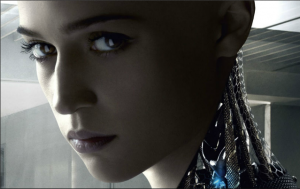RICHARD’S WEEKEND MOVIE REVIEWS FROM CP24! FRIDAY APRIL 24, 2015.
 Richard’s CP24 reviews for “The Age of Adeline,” “The Water Diviner” and “Ex Machina” with host Nneka Eliot.
Richard’s CP24 reviews for “The Age of Adeline,” “The Water Diviner” and “Ex Machina” with host Nneka Eliot.
Watch the whole thing HERE!
 Richard’s CP24 reviews for “The Age of Adeline,” “The Water Diviner” and “Ex Machina” with host Nneka Eliot.
Richard’s CP24 reviews for “The Age of Adeline,” “The Water Diviner” and “Ex Machina” with host Nneka Eliot.
Watch the whole thing HERE!
 Richard’s “Canada AM” reviews for “The Age of Adeline,” “The Water Diviner” and “Ex Machina” with host Beverly Thomson.
Richard’s “Canada AM” reviews for “The Age of Adeline,” “The Water Diviner” and “Ex Machina” with host Beverly Thomson.
Watch the whole thing HERE!
 The new Blake Lively movie The Age of Adaline sees its star play a woman who was frozen in time at age twenty-nine, never to age another day. No laugh lines, stiffness in the bones or grey hair for her. She drifts through life, an eternal twenty-something as her pals age and eventually die.
The new Blake Lively movie The Age of Adaline sees its star play a woman who was frozen in time at age twenty-nine, never to age another day. No laugh lines, stiffness in the bones or grey hair for her. She drifts through life, an eternal twenty-something as her pals age and eventually die.
How does she compare to friends and family? Well, in the film the youthful centenarian Lively has a daughter played by Ellen Burstyn, a veteran actress fifty-five years her co-star’s senior.
It’s a romantic fantasy that brings up an interesting question. Sure, the idea of defying age sounds intriguing, but why would you want to fall in love when there is no possibility of growing old together? That’s the dreamy question at the heart of the film; the notion that allows director Lee Toland Krieger to explore the mushier side of the story, but what about the engine that drives the tale—immortality?
With characters like Wolverine and Edward Cullen pulling in big box office bucks it’s not shocking that movies seem infatuated with eternal life. Nor should it come as a shock that actors are drawn to immortal characters. The obsession with youth is one thing, that’s a job requirement—perhaps that’s why the USA, with Los Angeles at the epicenter, is the world capitol of plastic surgery—but I think it goes beyond that.
With visions of an ageless Adaline dancing in my head I posed a simple question to Alex Garland, the director and screenwriter of this weekend’s artificial intelligence drama Ex Machina: “Why have movies about immortality been so popular with actors and filmmakers?” I got an intriguing answer.
“There is an interest floating around which is as much to do with longevity, as it is immortality,” he said, “but it contains immortality as a long-term goal.
“Broadly speaking what I would say, at least where filmmakers are concerned, is that they’re subject to the same zeitgeist things that everybody else is so what they will do is manifest it in their job.”
Perhaps that’s why in the coming months we’ll see eternal characters in everything from The Avengers: Age of Ultron and Terminator Genisys to Pan and Crimson Peak.
The rich and famous have always dreamed of extending natural life. For instance, although it’s an urban legend that Walt Disney was frozen cryogenically to be thawed later it makes a good and almost true sounding story. While doing working on Ex Machina Garland says he discovered tales of wealthy people looking to find immortality through science.
“The researchers might be quite realistic about what artificial intelligence can promise but the funders may be less realistic about it. One of the things that some of the funders are looking for, and I’ve heard this expressed very explicitly, not in a coded way but an absolutely straightforward way, is the ability to download yourself and for you to survive long as a result of your enormous wealth.
“Powerful people don’t want to die. Everyone else figures they don’t have a choice but the really powerful people figure they do have a choice and they are going to explore it just in case.”
I think Hollywood may be obsessed with immortality for one other reason. Film stock offers it’s own kind of eternity, where one never ages and on the screen Blake Lively will be the twenty-nine-year-old Adaline forever.
 “Ex Machina” is a high tech thriller that by and large ignores the tech to get down to the nitty gritty. Director and screenwriter Alex Garland (who previously scripted “28 Days Later” and “Sunshine”) places the story firmly in the world of artificial intelligence and then showcases the humanity (or lack thereof) of his characters, both flesh-and-blood and robotic.
“Ex Machina” is a high tech thriller that by and large ignores the tech to get down to the nitty gritty. Director and screenwriter Alex Garland (who previously scripted “28 Days Later” and “Sunshine”) places the story firmly in the world of artificial intelligence and then showcases the humanity (or lack thereof) of his characters, both flesh-and-blood and robotic.
When we first meet Caleb Smith (Domhnall Gleeson) he is a young, talented programmer at Bluebox, the world’s leading search engine. He is also the winner of a company wide contest to spend a week with Bluebook’s reclusive CEO, Nathan “The Mozart of Code” Bateman (Oscar Isaac). He arrives at Bateman’s remote complex to discover he is to take part in a Turing Test (named for “The Imitation Game’s” subject Alan Turing) to evaluate the ability of an automaton named Ava (Alicia Vikander) to show intelligent behaviour equal to, or undifferentiated from, that of a human being. Over seven sessions Caleb forms a deep connection with Ava as his relationship with alpha-male Nathan crumbles. In the end the young man must undergoes the greatest test of all—figuring out who to trust, man or machine.
With the cool austerity of Stanley Kubrick director Garland creates the antiseptic world of Bateman’s lair. Clinical and precise, it’s a stark backdrop for a sci fi story that is more concerned with ideas than special effects. It’s a “Frankenstein” story that is, as Bateman says, not interested in what people are thinking, but how people think.
And it will make you think. The Turing Test premise is an excuse to hang a thriller on, one that uses Ava’s artificial intelligence to have a look at how people can be manipulated with the bat of an eye or tilt of a head. Coupled with that it raises real issues regarding internet security—how much should your internet provider really know about your habits, likes and dislikes?—and surveillance.
I have to be deliberately sketchy with the plot details so as not to spoil the climax, but it’s a story that will stimulate conversation but does not ignoring the emotional elements of the Caleb’s tale.
Isaac once again proves to be a quiet but potent on-screen force as Bateman, always the smartest guy in the room, but one lacking the interpersonal skills to truly connect with people. Gleeson (who will next be seen alongside Isaac in “Star Wars: Episode VII – The Force Awakens”) is sympathetic and determined but it is Vikander who really impresses. She’s equal parts warmth and chilly precision as a robot who wants more than to be a machine.
“Ex Machina” is being presented as sci fi, but it really is a human drama; a human drama where the main character has a fibre optic nervous system.
 Richard discusses “Star Wars VII: The Force Awakens” with CTV NewsChannel anchor Merella Fernandez.
Richard discusses “Star Wars VII: The Force Awakens” with CTV NewsChannel anchor Merella Fernandez.
Watch the whole thing HERE!